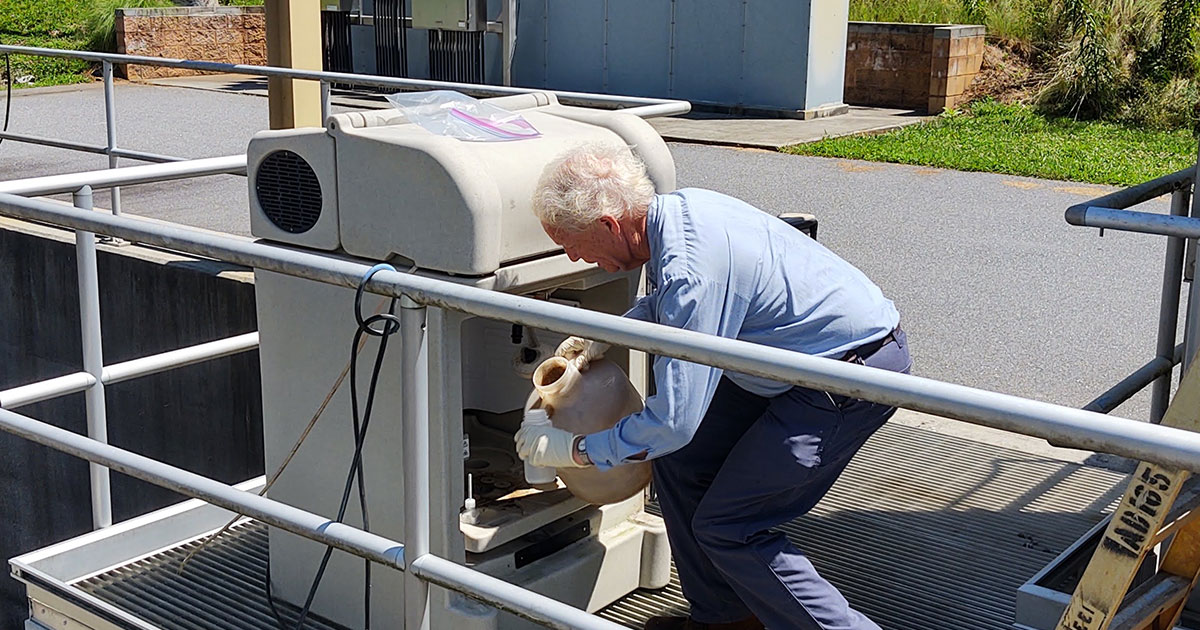A public-private partnership in western North Carolina led by Mathematica is now contributing data to support a federal initiative to strengthen early warning systems for COVID-19 and other infectious diseases across the country. Since late July 2020, pilot studies in North Carolina’s Jackson and Haywood counties have helped state and local public health authorities anticipate changing trends in COVID-19 infections through weekly wastewater surveillance. Data from those studies will now inform national efforts to monitor for the SARS-CoV-2 virus and concerning viral variants.
The Centers for Disease Control and Prevention (CDC) and the U.S. Department of Health and Human Services have initiated the National Wastewater Surveillance System to help public health officials better understand the extent of COVID-19 infections in communities. State, tribal, local, and territorial health departments can submit wastewater testing data into a national database that enables public officials to compare wastewater viral concentrations with COVID-19 case counts across jurisdictions over time.
As of mid-May, wastewater data from Jackson County is being collected, analyzed, and shared with the CDC through a collaboration between Mathematica, the North Carolina Department of Health and Human Services, the Jackson County Department of Public Health, the Tuckaseigee Water & Sewer Authority, the McLellan Lab at the University of Wisconsin-Milwaukee, and Dogwood Health Trust. So far, 31 states, 3 cities, and 2 territories are participating in the CDC pilot.
“Our pilot project started due to an interest in furthering this research as another tool for determining the spread of illness to make appropriate public health decisions,” says Shelley Carraway, director of the Jackson County Department of Public Health. “We are so proud that Jackson County’s leadership in pioneering new methods of detecting COVID-19 is now informing a national initiative by the CDC.”
Last year, results from a four-week pilot study that Mathematica and its partners conducted in Jackson County suggested that officials could identify rising or falling infections up to nine days before individual testing would reflect such trends. Dogwood Health Trust, which supported the original study, funded an extension of the COVID-19 wastewater testing in Jackson County and an expansion of wastewater testing into neighboring Haywood County. In both counties, data from December 2020 through April 2021 showed the same general trend: a spike in viral loads in sewage samples collected in late December and early January, followed by a steady decline in the ensuing months. Beyond providing weekly updates on circulating SARS-CoV-2 viral levels, the ongoing pilot study provides information on the presence of new viral variants first discovered in India, the United Kingdom, South Africa, and Brazil. To date, the viral variants have not been detected in most of the wastewater samples, but a few samples have shown trace levels of the U.K. and Delta variants, suggesting that these may be circulating in low levels in Jackson County.
Further analysis from Mathematica enables public health officials in North Carolina to assess the wastewater data in the context of other measures of risk and vulnerability, such as new reported cases, the percentage of county residents who are still unvaccinated, and trends in population mobility.
“With wastewater surveillance in place, we’re essentially able to anonymously test and re-test 30 percent of the population every week, and for a fraction of the cost of clinical testing,” says Aparna Keshaviah, a senior statistician at Mathematica who is leading the surveillance in western North Carolina. “And because Jackson and Haywood counties are so alike—both are mountain communities with a sewered population that is similar in size and demographics—differences in the data can shed light on some of the challenges and needs for standardization when translating wastewater measures for public health action.”
Insights from the pilot studies in the two western North Carolina counties are informing national discussions about the use of wastewater testing. The counties appeared as case studies in a recent presentation about translating wastewater data for policymaking at a national workshop convened by the U.S. Department of Homeland Security and the National Institute of Standards and Technology. In addition, Keshaviah recently appeared on STAT’s First Opinion Podcast, discussing a recent journal article about the development of the National Wastewater Surveillance System and its use in detecting infectious diseases and illicit drug use in communities.
To learn more about Mathematica's work on wastewater testing and COVID-19, please visit our website.
Contact
-
J.B. Wogan
jwogan@mathematica-mpr.com
202-250-3547


